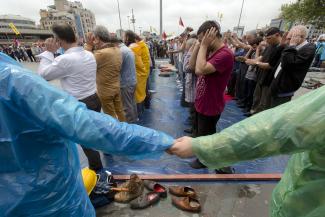Protests
Suspicious

Some protesting men held their Friday prayers on Taksim Square. Faith leaders allowed wounded demonstrators to be taken care of in mosques. The rallies were not anti-religious, they insisted on pluralism in the face of the government’s authoritarian leanings.
Prime Minister Recep Tayyep Erdogan’s policies are increasingly marked by his personal understanding of the Koran. The tragedy is that he has a history of liberalising his country. He used to expand freedoms, but now he is curtailing them. He was right to allow young women to wear headscarves in university. His more recent advice on how many children women should have and what his people should eat and drink sounds bossy however. It is undemocratic, moreover, to draft and implement urban planning without public participation.
Turkey is obviously no totalitarian state. The new ban on selling alcohol at night is not more restrictive than Britain’s pub closing times were for decades. It is telling, however, that Erdogan calls all beer drinkers alcoholics and that he insults demonstrators as looters and terrorists.
The protests on Taksim Square looked like the uprising on Tahrir Square in 2011, but they were quite different. Back then, Egyptians turned against the authoritarian alliance of the military, the judiciary and the state bureaucracy that had run the country for decades. Some of its constituents tried to cozy up to the Muslim Brothers’ government. However, the recent Egyptian opposition campaign that demanded President Mohamed Mursi's resignation was of a similar nature as Turkish demonstrators' demands for public participation and tolerance. Whether Egypt's new, military-backed leadership will prove pluralistic or authoritarian as in the past remains to be seen.
In historical and ideological terms, Erdogan’s AKP is related to the Muslim Brothers. However, it managed to undo by democratic means the power cartel of Turkey’s military, judiciary and bureaucracy that had been a lot like Egypt’s, including the army’s huge relevance in business affairs. The AKP won elections convincingly. Erdogan and allies established it as a moderately religious party to escape the trap of unelectable fundamentalism.
The old power cartel had wrongly suppressed the faith in the name of secularism, which really should be about a state’s equidistance to all belief systems. This policy had to be corrected. In doing so, the AKP opened up to ethnic minorities that had suffered marginalisation. Unfortunately, Erdogan’s increasingly repressive stance shows that his mindset it not that different from the one of the generals in the past. In his view, any unrest must have been stirred by dark forces: looters, terrorists, foreign powers, the international media and the “interest rate lobby” of global financial markets. He thinks that only one person can be in command – and that one person must be in command.
The protest movement, in contrast, is pluralistic, relying on various political and social forces. The movement is young moreover. This age group never experienced military rule. Its members claim control of their own lives.
The AKP was ambivalent in June. Some leaders expressed criticism of Erdogan, but masses of followers applauded him. This party could become a Muslim equivalent of European Christian Democracy, but it could also degenerate into a totalitarian institution.
Erdogan is leading it towards authoritarian Sunni rule. In view of June’s police violence, the EU can only negotiate accession with him for form’s sake. At this point, substantial progress is impossible.
Unfortunately, however, the EU has been keeping Turkey at a distance for years, not least because Paris and Berlin wanted it to. The disastrous impression took root that the EU feels suspicious about a Muslim nation and does not really want Turkey to join. Accession sceptics in the EU must feel re-assured by the teargas dramas of recent weeks. They should ask themselves, however, how democratisation and modernisation can be promoted in the Muslim world if not through cooperation and opening up. Recent EU policymaking has definitely not resulted in making permanent the promising democratisation trends that marked this important NATO nation during Erdogan’s first years in power.









